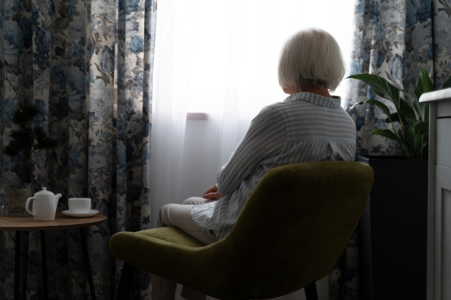Find out the virus that increases one’s risk of developing dementia!
By
VanessaC
- Replies 12
The latest research has revealed a startling link between a common virus and an increased risk of dementia.
The culprit? The herpes simplex virus type 1 (HSV-1)—a virus that is believed to affect around 80 per cent of the Australian population.
This virus, which can cause both cold sores and genital herpes, is carried by most people, often without displaying any symptoms.
But the real shocker is that carrying this virus could potentially double your risk of developing dementia.
The research, published in the Journal of Alzheimer’s Disease, followed more than 1,000 participants over a 15-year period.
A staggering 82 per cent of these participants were found to carry HSV-1 antibodies. The study found that those carrying the virus were twice as likely to develop dementia during the study period.
These findings add to a growing body of evidence suggesting that certain types of viral infections could play a significant role in cognitive decline.
With almost 421,000 people in Australia currently living with different forms of dementia, understanding the factors that contribute to this condition is more important than ever.
Interestingly, the researchers found that the association between HSV-1 and dementia occurred regardless of the two strongest predicting factors of the disease—age, and the presence of a variant of the gene APOE-4.
In fact, those who carried the APOE-4 variant were no more likely to show a cognitive decline linked to HSV-1 antibodies.
Alzheimer's disease, the most common form of dementia, accounts for 70 per cent of dementia cases.
It is thought to be caused by the abnormal build-up of proteins in the brain, leading to a progressive decline in cognitive function.
The disease typically progresses through three stages: mild, moderate, and advanced, with early signs including memory loss, poor judgement, and brain fog.
Early-onset Alzheimer’s can appear as early as the 40s, 50s, and early 60s.
The number of Australians affected by dementia is also projected to rise to 812,500 by 2054.
Erika Vestin, a Medical Student at Uppsala University and Co-author of the study, highlighted the significance of the research.
'What’s special about this particular study is that the participants are roughly the same age, which makes the results even more reliable since age differences, which are otherwise linked to the development of dementia, cannot confuse the results,’ she said.
'More and more evidence is emerging from studies that, like our findings, point to the herpes simplex virus as a risk factor for dementia.'
Further studies aim to investigate whether drugs known to combat the herpes simplex virus can also reduce the risk of dementia.
Vestin and her colleagues are calling for randomised controlled trials to explore this possibility.
 What are your thoughts on these findings? Have you or a loved one been affected by dementia? Share your thoughts and experiences in the comments below.
What are your thoughts on these findings? Have you or a loved one been affected by dementia? Share your thoughts and experiences in the comments below.
The culprit? The herpes simplex virus type 1 (HSV-1)—a virus that is believed to affect around 80 per cent of the Australian population.
This virus, which can cause both cold sores and genital herpes, is carried by most people, often without displaying any symptoms.
But the real shocker is that carrying this virus could potentially double your risk of developing dementia.
The research, published in the Journal of Alzheimer’s Disease, followed more than 1,000 participants over a 15-year period.
A staggering 82 per cent of these participants were found to carry HSV-1 antibodies. The study found that those carrying the virus were twice as likely to develop dementia during the study period.
These findings add to a growing body of evidence suggesting that certain types of viral infections could play a significant role in cognitive decline.
With almost 421,000 people in Australia currently living with different forms of dementia, understanding the factors that contribute to this condition is more important than ever.
Interestingly, the researchers found that the association between HSV-1 and dementia occurred regardless of the two strongest predicting factors of the disease—age, and the presence of a variant of the gene APOE-4.
In fact, those who carried the APOE-4 variant were no more likely to show a cognitive decline linked to HSV-1 antibodies.
Alzheimer's disease, the most common form of dementia, accounts for 70 per cent of dementia cases.
It is thought to be caused by the abnormal build-up of proteins in the brain, leading to a progressive decline in cognitive function.
The disease typically progresses through three stages: mild, moderate, and advanced, with early signs including memory loss, poor judgement, and brain fog.
Early-onset Alzheimer’s can appear as early as the 40s, 50s, and early 60s.
The number of Australians affected by dementia is also projected to rise to 812,500 by 2054.
Erika Vestin, a Medical Student at Uppsala University and Co-author of the study, highlighted the significance of the research.
'What’s special about this particular study is that the participants are roughly the same age, which makes the results even more reliable since age differences, which are otherwise linked to the development of dementia, cannot confuse the results,’ she said.
'More and more evidence is emerging from studies that, like our findings, point to the herpes simplex virus as a risk factor for dementia.'
Further studies aim to investigate whether drugs known to combat the herpes simplex virus can also reduce the risk of dementia.
Vestin and her colleagues are calling for randomised controlled trials to explore this possibility.
Key Takeaways
- Research has indicated that being infected with herpes simplex virus type 1 (HSV-1) could double an individual's risk of developing dementia.
- The study tracked more than 1,000 participants over 15 years, showing that those with HSV-1 were twice as likely to develop dementia, even considering other risk factors.
- The research, which took place in Sweden, adds to evidence suggesting a link between viral infections and cognitive decline.
- Further investigation is needed to see if antiviral drugs for HSV-1 could potentially lower dementia risk, with calls for randomised controlled trials to explore this possibility.









